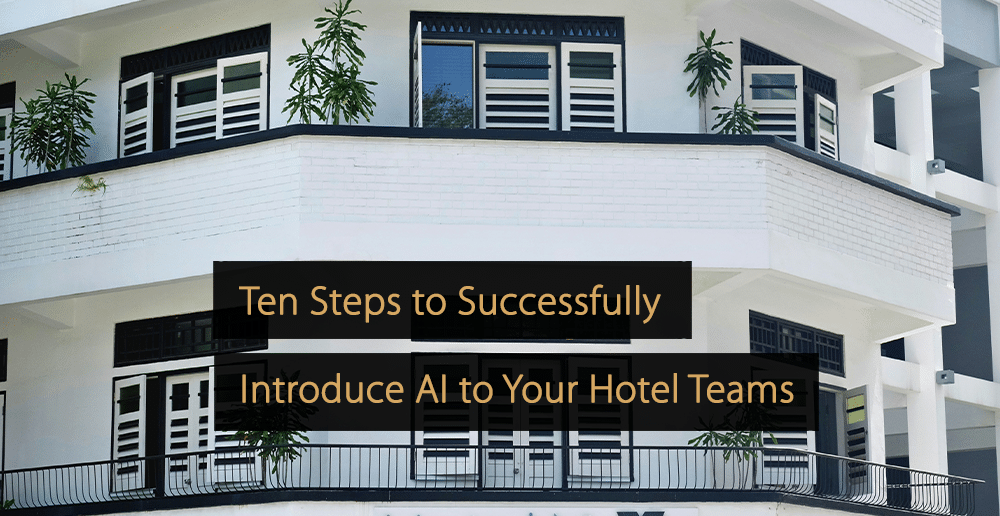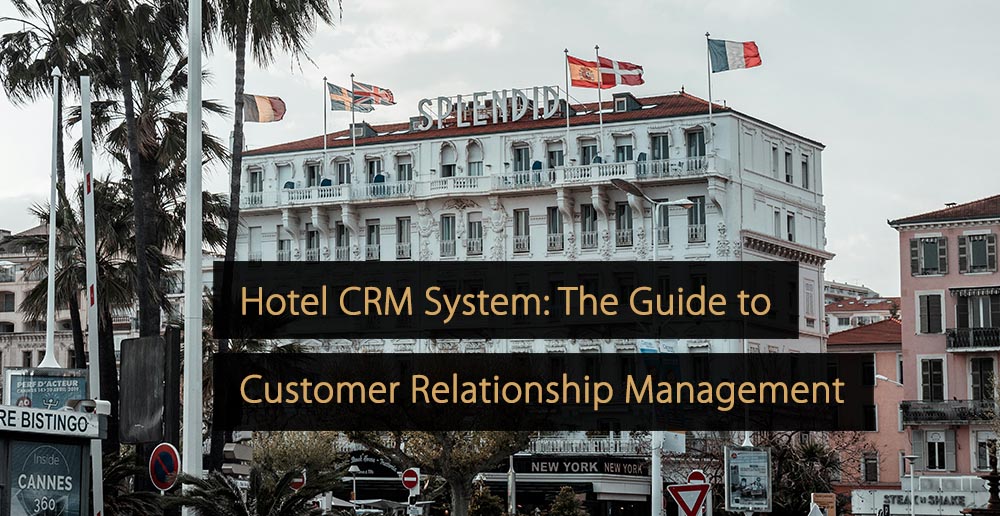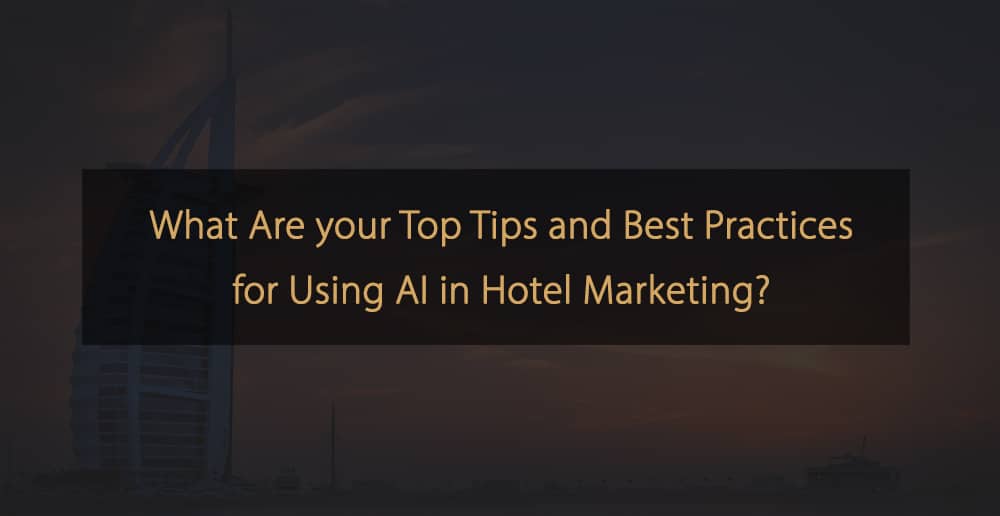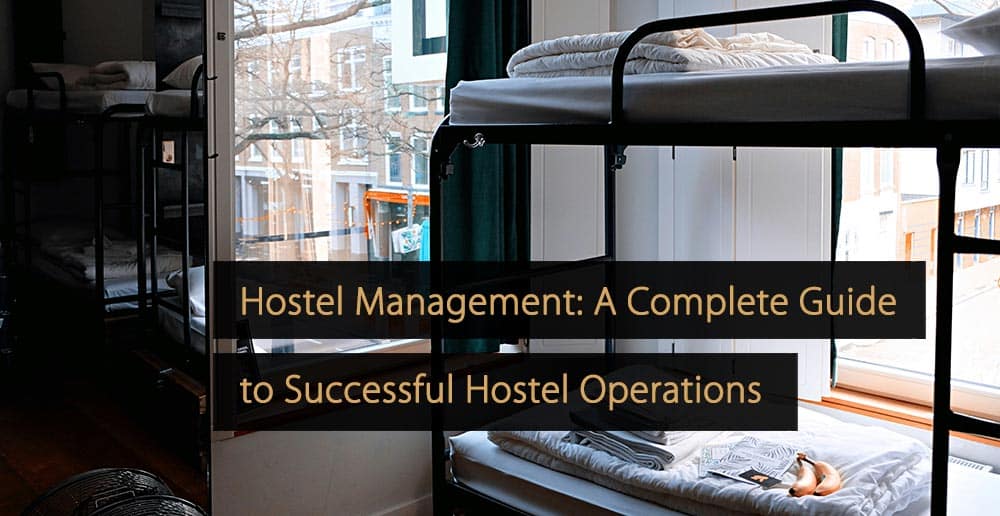Wenn Sie planen, in Ihrem Hotel eine neue intelligente Technologie oder ein Tool für künstliche Intelligenz einzuführen, müssen Sie einen gründlichen Onboarding-Prozess für das Team entwerfen. Die Einarbeitung Ihres Hotelpersonals in eine neue Lösung ist der Schlüssel zu einer erfolgreichen Einführung und betrieblichen Effizienz, kann sich aber auch positiv auf die Arbeitsmoral und Mitarbeiterbindung auswirken. Viele Hoteliers verpassen diese Gelegenheit, indem sie die neue Technologie überstürzt implementieren. Dieser Artikel listet die wichtigsten Schritte auf, die Sie berücksichtigen sollten.
Der Elefant im Raum: Die Angst davor, dass KI Arbeitsplätze im Gastgewerbe übernimmt
Es ist nur möglich, mit der Planung des Onboarding-Prozesses zu beginnen, indem man die echte gemeinsame Sorge des Hotelpersonals anerkennt – die KI könnte ihnen den Arbeitsplatz wegnehmen. Wie in einer wissenschaftlichen Studie festgestellt wurde, die in der Zeitschrift „Fortschritte in der Gastgewerbe- und Tourismusforschung“ im Jahr 2023 ist es ein Faktor, der sich oft negativ auf die Leistung, das Verhalten und die Einstellung der Mitarbeiter auswirkt.
Wenn Sie jedoch dieses Konzert ansprechen und eine offene Diskussion über die Anwendungsmöglichkeiten von KI im Gastgewerbe führen, können Sie mehr tun, als nur die negativen Auswirkungen abzumildern. Nutzen Sie diese Gelegenheit, um Vertrauen in eine Lösung aufzubauen und zu fördern, die letztendlich Ihren Teams zugutekommt und sich wiederholende und langweilige Teile ihrer Arbeit automatisiert.
Onboarding von Hotelteams mit KI in 10 Schritten
Im Geiste dieser Einstellung finden Sie nachfolgend die zehn Schritte zur Reduzierung von Reibungsverlusten im KI-Implementierungsprozess.
1. Schulen und beteiligen Sie Ihr Hotelteam frühzeitig
Bevor Sie konkrete KI-Tools einführen, die Sie implementieren möchten, nehmen Sie sich Zeit, Ihr Team über die Rolle der KI im Gastgewerbe und relevante Trends zu informieren. Teilen Beispiele für andere Hotelmarken, die KI nutzen, und betonen Sie den Zweck und die Vorteile. Lassen Sie Raum für Fragen, damit sich Ihr Team in den Prozess eingebunden und engagiert fühlt.
2. Gehen Sie proaktiv auf KI-bezogene Bedenken ein
Gehen Sie auf alle Bedenken in Bezug auf KI ein, insbesondere auf die Angst vor Arbeitsplatzverlust. Erklären Sie, wie KI die Rollen des Personals erweitert und das Gästeerlebnis verbessert, anstatt menschliche Arbeit zu ersetzen. Prüfen Sie, ob Ihr Technologieanbieter ein Leitbild oder andere Materialien hat, die diese Bedenken ansprechen, und teilen Sie sie dem Team mit.
3. Gewinnen Sie die Unterstützung des Top-Managements
Es muss mehr sein, als nur die Kosten der neuen Technologie zu bestätigen. Versuchen Sie, die Zusage der Hotelleitung für die erforderlichen Ressourcen, einschließlich Zeit für Schulung und Support, zu erhalten. Ihre sichtbare Unterstützung wird den Einführungsprozess in den verschiedenen Abteilungen erleichtern.
4. Setzen Sie klare, realistische Erwartungen
Kommunizieren Sie klar, was die KI-Implementierung mit sich bringt, einschließlich Zeitplänen und dem erforderlichen Arbeitsaufwand jedes Teammitglieds. Diese Transparenz hilft dabei, realistische Erwartungen zu setzen.
5. Führen Sie mit Transparenz und Offenheit
Sprechen Sie offen mit Ihrem Team über die Vorteile und Herausforderungen der Implementierung von KI. Versuchen Sie, die Bedenken Ihres Teams vorherzusehen und gehen Sie proaktiv darauf ein, um Ihr Engagement zu demonstrieren. Ehrliche Diskussionen können zu einem besseren Verständnis und Engagement des Teams führen.
6. Konzentrieren Sie sich auf konkrete Vorteile
Beginnen Sie mit einem allgemeinen Überblick über den Arbeitsbereich, dem die KI zugutekommt, und heben Sie dann ganz konkrete Probleme hervor, die die KI für Ihre Mitarbeiter lösen wird. Präsentieren Sie nachvollziehbare Vorteile, um den Fall überzeugender zu machen. Bitten Sie den Technologieanbieter um relevante Fallstudien, die Sie mit Ihrem Team teilen können.
7. Skizzieren Sie den Integrationsprozess
Erklären Sie, wie sich die KI in bestehende Hotelmanagementsysteme integrieren lässt und welche Änderungen sie mit sich bringt. Ein klares Verständnis der neuen digitalen Infrastruktur und aller notwendigen Anpassungen ist für einen reibungslosen Übergang entscheidend.
8. Umfassende Schulungen und Ressourcen bereitstellen
Dieser Schritt kann als zusätzlicher Schritt angesehen werden, ist aber möglicherweise nicht für kleinere Teams geeignet. Wenn Sie ihn dennoch als lohnende Investition erachten, bieten Sie maßgeschneiderte Schulungen an, die auf unterschiedliche Rollen und technische Kompetenzniveaus zugeschnitten sind. Fragen Sie den Technologieanbieter nach verfügbaren Schulungsmaterialien (Self-Service-Hilfecenter, Videoanleitungen, Dokumentation) und teilen Sie diese mit Ihrem Team.
9. Implementieren und Überwachen
Wenn möglich, beginnen Sie mit einem Pilotprogramm, um Feedback zu sammeln und den Prozess nach Bedarf anzupassen. Überwachen Sie relevante Schlüsselkennzahlen wie Kundenzufriedenheitswerte und Automatisierungsraten, um den Erfolg der KI-Implementierung zu messen. Teilen Sie die Ergebnisse mit dem Team, um die neue Technologie in Aktion zu zeigen. Möglicherweise sind im Laufe der Zeit noch Anpassungen erforderlich, aber Transparenz ist sehr hilfreich.
10. Bemühungen anerkennen und belohnen
Vergessen Sie nicht, die Bemühungen des Teams bei der Einführung neuer Technologien anzuerkennen und zu belohnen. Wertschätzen Sie individuelle Beiträge, um die organische Positionierung des „Meister“ die zu Experten im Umgang mit dem neuen Tool werden. Stellen Sie bei Bedarf zusätzliche Unterstützung bereit, um sicherzustellen, dass jeder die neue Technologie kompetent nutzen kann.
Wie viel Onboarding-Aufwand ist zu viel Aufwand?
Wenn Sie die oben genannten zehn Schritte befolgen, erhöhen Sie die Chancen, neue Technologien in Ihrem Hotel erfolgreich einzuführen. Die optimale Umsetzung einiger dieser Schritte kann jedoch ressourcenintensiv und zeitaufwändig sein. Sie kennen Ihre Teams am besten – nutzen Sie diese Informationen, um zu bestimmen, wie umfangreich der Onboarding-Prozess sein muss, um den Anforderungen Ihrer Mitarbeiter gerecht zu werden.
Nutzen Sie diese drei Fragen als Denkanstoß:
- Wie gut wissen Ihre Mitarbeiter über KI und deren Anwendung im Gastgewerbe?
Wenn Sie bereits über intelligente Technologien verfügen, können Sie den Prozess optimieren und auf Ihrem vorhandenen Wissen und Ihrer Erfahrung mit anderen Tools aufbauen.
- Wie wichtig ist Ihrem Top-Management Innovation?
Je engagierter sie sind, desto eher erkennen sie die Bedeutung der Schulung ihrer Mitarbeiter im Bereich KI und weisen die Ressourcen entsprechend zu, was sich wiederum auf den Umfang des Onboarding-Prozesses auswirkt.
- Ist Ihr Team bereit, KI zu nutzen?
Neben der technischen Kompetenz gibt es noch weitere Faktoren, die Sie berücksichtigen sollten. Ist es ein guter Zeitpunkt, ein neues Tool einzuführen? Verfügt Ihr Team zu diesem Zeitpunkt über die nötige Energie und Konzentration, um sich der Schulung zu widmen? Steht es der Aussicht auf die Einführung neuer Technologien skeptisch oder begeistert gegenüber?
Die erfolgreiche Integration von KI in Ihr Hotel erfordert Arbeit in bestimmten Bereichen: Binden Sie Ihr Team frühzeitig ein, gehen Sie auf Bedenken ein, gewinnen Sie die Unterstützung des Managements, setzen Sie klare Erwartungen und bieten Sie umfassende Schulungen an. Gehen Sie transparent voran und erkennen Sie Ihre Bemühungen an. So können Sie die Betriebseffizienz steigern, aber auch die Moral und die Mitarbeiterbindung verbessern und so den Weg für einen reibungsloseren technologischen Übergang ebnen.
Weitere Tipps zum Wachstum Ihres Unternehmens
Revfine.com ist die führende Wissensplattform für die Hotel- und Reisebranche. Fachleute nutzen unsere Erkenntnisse, Strategien und umsetzbaren Tipps, um sich inspirieren zu lassen, den Umsatz zu optimieren, Prozesse zu erneuern und das Kundenerlebnis zu verbessern.Entdecken Sie Expertenratschläge zu Management, Marketing, revenue management, Betrieb, Software und Technologie in unserem speziellen Hotel, Gastfreundschaft, und Reise Tourismus Kategorien.








Leave A Comment